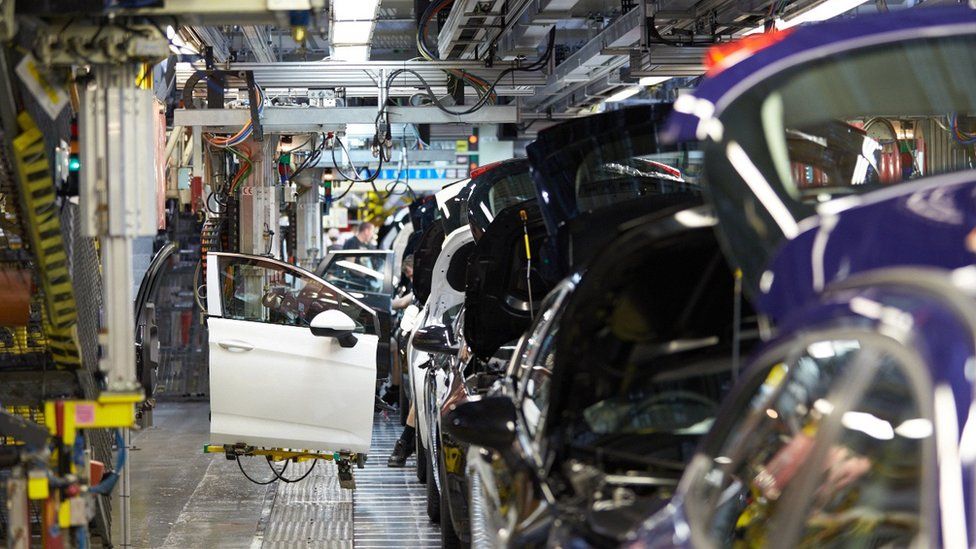Vauxhall plans 400 job cuts at Ellesmere Port as sales fall
- Published

Vauxhall is cutting about 400 jobs at its Ellesmere Port car plant due to falling sales.
The carmaker, now owned by France's PSA Group - maker of Peugeot and Citroen - is "facing challenging European market conditions," a spokesman said.
Ellesmere Port, which makes the Astra models, will move staff from two production shifts to one in early 2018.
PSA said that manufacturing costs at Ellesmere were higher than other "benchmark plants" in the group.
Vauxhall employs about 4,500 people in the UK, with about 1,800 at Ellesmere Port. The company also has a factory at Luton, which makes vans.
PSA became Europe's second biggest carmaker after Volkswagen in August when it completed the purchase of Vauxhall and German brand Opel from US car giant General Motors.
UK Prime Minister Theresa May personally sought assurances from PSA chief executive Carlos Tavares during a phone call in February.
Last month, Mr Tavares said it was hard to decide upon the group's strategy for Vauxhall given a lack of clarity over the UK's plans to leave the European Union.
PSA boss Carlos Tavares was asked last month about guarantees for Vauxhall-Opel workers
However, a Vauxhall spokesman said the move from two shifts to one was nothing to do with Brexit uncertainty, but was about maintaining competitiveness in a changing industry.
He pointed out that sales of so-called sports utility vehicles (SUVs) have grown rapidly across Europe, while the type of five-door estates and saloons made at Ellesmere Port have fallen.
Earlier this year, Ellesmere was producing an annual rate of about 140,000 Astra cars.
The spokesman said there will be a new-generation Astra model in the early 2020s, so Vauxhall wanted to make Ellesmere Port more productive so it can get this car contract.
Sterling impact
However, PSA's statement on Sunday suggested there would no decision until Brexit uncertainty had cleared.
"Once [PSA] has enough visibility on the future trading relationship with the EU, and the plant competitiveness has been addressed, the company will be in a position to consider future investments."
Prof David Bailey, from Aston Business School, said the shift in market trends to SUVs was only part of the problem for Ellesmere Port.
He told the BBC: "The depreciation of sterling since the Brexit vote has meant that the cost of importing components has gone up, so it's a more costly plant."
PSA's other acquisition from General Motors, Opel, employs about 33,500 staff in Germany, Poland, Hungary, Austria, Spain and Italy.
Prof Bailey said the only way PSA can make the Vauxhall-Opel purchase work is by cutting costs out of the business.
Tackling Ellesmere Port's competitiveness now could turn out to be a very positive move for the business, "but it does show how vulnerable the plant is," he said.
The Unite union said it would not comment on any job losses until it had spoken to shop stewards at Ellesmere Port on Monday.
- Published5 July 2017
- Published6 March 2017
- Published3 March 2017